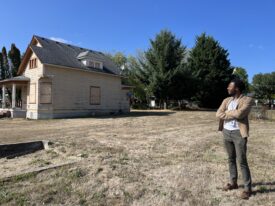If you paid attention to the news last week, you saw that US housing prices tumbled faster than expected in December—a sign that the national housing bubble is still in the process of deflating. And what a deflation it’s been: the Case-Shiller Home Price Index of major US metro areas had fallen 27 percent from its August 2006 peak.
For the Northwest, the news is perhaps a little less dire. Housing prices are down “only” 17 percent from their highs in Seattle, and 15 percent in Portland. That’s still significant, obviously, but a bit less gruesome than the overall US market for metro-area housing.
 But if you take a closer look at the numbers, it’s not really accurate to say that Portland and Seattle homes are holding their value well. Instead, the Northwest housing market simply didn’t overheat the way it did in Florida, California, and in cities like Phoenix and Las Vegas.
But if you take a closer look at the numbers, it’s not really accurate to say that Portland and Seattle homes are holding their value well. Instead, the Northwest housing market simply didn’t overheat the way it did in Florida, California, and in cities like Phoenix and Las Vegas.
In the chart to the right, the orange line is the Case-Shiller Composite-20 home price index, which tracks housing prices in 20 major cities by looking at the sale of identical houses. (Tracking same-house sales helps control for the effects of changes in the stock of housing.) As you can see, it took a while for the housing bubble to really get going in Seattle and Portland. And the Northwest bubble never quite reached the insane heights that it did in many parts of the country.
In a nutshell, then, housing prices in Northwest cities are deflating less because they inflated less. As major west coast cities go, Seattle and Portland got off pretty lightly during the housing bubble; we were bit players in a much bigger story.
Obviously, though, it didn’t seem that way at the time.
While the bubble was raging, press accounts seemed to talk about the Northwest’s housing inflation as somehow unique, unprecedented in scale, and the result of very special local circumstances. In short, the housing bubble was covered first and foremost as a local story, not as a small piece of a national one.
And to make matters worse, everyone looking at the issue of rising home prices had a different, primarily local diagnosis for skyrocketing home prices: Some said it was too much regulation. Others blamed new, expensive condos for crowding out the middle class. And so on.
Now, I’m not suggesting that I know better than all of the self-proclaimed housing experts. But one thing is pretty clear: the housing bubble distorted everything. The bubble was national in scope, it was somewhat unpredictable, and it was irrational. Sure, housing prices were probably influenced a bit by local regulations, regional economic trends, and all sorts of other forces. But trying to read the tea leaves to understand why housing prices accelerated faster in Phoenix than in Portland, faster in Portland than in Dallas, and faster in 2005 than in 2004, is something approaching pointless.
To me, the people who were so sure they understood the dynamics of an irrational, hyperventilating housing market—and I’m particularly thinking of the condo-bashers and the anti-growth management types—were just fooling themselves.
Of course, I don’t really mind when people fool themselves. What I do mind is people who invent facts—and then present themselves as having facts on their side. And where affordable housing is concerned, there was an an awful lot of that going around.








Matt the Engineer
It’s nice that this has come full circle. Sometimes all the data out there won’t get you an answer, and you have to stick to theory. Housing costs may have gone up, but would they have gone up more if we hadn’t built more housing? Basic supply and demand says absolutely yes.
Steve Hoyt-McBeth
While the climb in housing prices in Portland didn’t match the insanity of the national average, that hasn’t provided much padding for the fall. The Oregonian reports that Oregon’s foreclosure rate ranks fifth nationally:http://blog.oregonlive.com/nwheadlines/2009/02/todays_headlines_foreclosures.html
Jan Steinman
To Matt The Engineer, I’m not sure I agree with your argument that prices would have gone up more if more housing hadn’t been built.I think the “bubble” was self-limiting, and would have occurred to a similar extent, regardless of supply and demand. Adam Smith’s “invisible hand” does not take speculation into account.Are you claiming that all those people who drove the prices up had an un-met “demand” for housing? Surely not!There was a mass psychosis that homes were investments, rather than homes. People were fearful they were missing out on something, and they “flipped” houses unnecessarily, they bought way bigger houses than they needed, they tolerated way higher mortgage payments than they should have, they bought vacation houses and rental property—all aided by a huge government subsidy to the banking industry (tax deductions for housing interest), cloaked in feel-good terms like “ownership society” and “the American dream.”On a strictly “supply and demand” basis, housing costs should go up proportional to population growth—about 2% per year—since there is really no “demand” for more than one house (unless you’re John McCain—wonder how his portfolio is doing these days!)There’s a lot of blame to go around here, but don’t pretend that building more houses (and more of them, huge, upscale houses) somehow made things better. Many of those houses are now sitting empty. The supply has gone up irrationally, and the demand has therefore gone down.
The Rev Jester
I don’t think supply and demand for housing had anything to do with the housing inflation we’ve seen of the last 10 years or so. Too many people used them as investments, buying and flipping multiple homes to take advantage of the feeding frenzy, ad nauseum.There are too many people with houses as investments who complain about how they were affected. Frankly I find this sick and terrible. If houses were dealt with as a *place to live* and not an investment, my friends and I would actually be able to afford a house in the city limits. However, even with an increase in available units (How many houses have you seen staying on the market for over 6 months now? I see them all over!) the prices still haven’t fallen to something affordable to the median household income.I wish we could make a “first” or “primary” house price and then a “secondary” price to encourage homes being lived in. Lest we become a version of Lopez Island, with plenty of available houses, but no affordable housing, because those houses are owned but only occupied two weeks of the year as vacation homes.
Matt the Engineer
Jan, “Are you claiming that all those people who drove the prices up had an un-met “demand” for housing? Surely not!” Surely so! There were certainly circumstances that drove this demand up, but you must see this as a demand for housing. The fact that they bought houses must show they had a demand, right?”On a strictly ‘supply and demand’ basis, housing costs should go up proportional to population growth” No. I think you misunderstand supply and demand. If we have 100 houses that normally cost $100k, and we have 101 families will the new price be $101k? No, it will be a bit more than the poorest person can afford or is willing to pay.”Many of those houses are now sitting empty.” If this is true, then you must see this as a temporary condition. No investor can make money on an empty house, and prices will go down. Didn’t we start off talking about affordable housing?The only way we can have more supply than demand is by having 100% of the people that want a home already owning a home. That is clearly not the case, and never will be the case without homelessness being irradiated and the demise of the rental market. I think something you’re missing is that when supply goes up prices will always go down in relative terms. At the market’s peak, prices would have been higher if we hadn’t built more housing (1). At the market’s bottom, we have more affordable housing (2). (1) Consider the peak of the market with, say, 100 houses and 500 buyers. Won’t houses cost less than if there were 50 houses and 500 buyers?(2) Consider the bottom of the market with, say, 300 houses and 500 buyers. Won’t houses cost less than if there were 250 houses and 500 buyers?
Matt the Engineer
Make that “eradicated.” Nobody wants to irradiate the homeless.
Clark Williams-Derry
Jan -I agree with much of what you said—there was a huge element of mass psychology and self-delusion in the runup of housing costs.But I definitely disagree about this:“On a strictly “supply and demand” basis, housing costs should go up proportional to population growth—about 2% per year—since there is really no “demand” for more than one house”This is simply false. (Sorry to be so blunt!!) The relationships among housing costs, population growth, housing supply, income growth, regional amenities, local amenities, inflation, local economic trends, zoning and regulatory restrictions, etc. are very complex, and don’t boil down to anything like your proposed formula.Also—if housing supply stays stagnant but population increases by 2% per year, that DOES NOT mean that housing prices will rise by 2%. It just doesn’t. It depends on the particular elasticity of housing price with respect to supply. I don’t have any clue what that is, offhand—I haven’t seen a study on the subject. My intuition tells me that if housing is in short supply, and there are more people than there are housing units, that housing prices will skyrocket!! That’s what happens with gasoline, and housing is even more of a necessity than gasoline is.This is my favorite article on the subject of housing price trends—easy to digest, and fascinating, from the New York Times. It follows a single house in Amsterdam for nearly 400 years. Over the very long haul, there have been eras of rapid inflation, gradual deflation, and more gyrations. I’d also recommend taking a look at long-term Case-Shiller house price index data—a nice graph is here:http://matrix.millersamuel.com/?p=838It does a good job of showing how insane the housing price runup has been. But it also shows that there’s not a simple relationship over time between population growth and housing prices, at least at the national level.